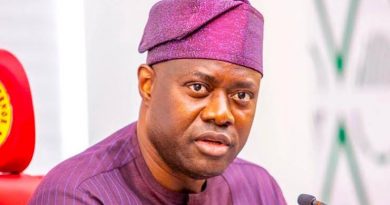Why Nigerians Witnessed Widespread Blackouts – FG
Why Nigerians Witnessed Widespread Blackouts – FG
Figures obtained on Monday from the Nigeria Electricity System Operator, an arm of the Federal Government’s power transmission company, showed that the national electricity grid actually crashed from a peak of 3,703 megawatts to as low as 9MW on Sunday.
Nigeria witnessed widespread blackouts on Sunday after the national grid collapsed around 6.49pm, before engineers from the Transmission Company of Nigeria strived to ensure the recovery of the grid.
READ ALSO: Three Military Officers Faint During Democracy Day Parade in Abuja
The PUNCH had reported on Monday that Sunday’s grid collapse was the fifth in 2022, a development that made many power distribution companies to shut down their various outgoing electricity feeders.
Data sourced from the NESO on Monday in Abuja, which showed the performance of the national grid on Sunday, indicated that the peak generation on Sunday of 3,703MW was recorded at 5am.
But this crashed to 9MW at 7pm on Sunday, according to the NESO, leading to the eventual collapse of the national grid.
Various Discos including Enugu Electricity Distribution Company Plc, Abuja Electricity Distribution Company, Kaduna Electricity Distribution Company, among others, had confirmed the grid collapse in various messages on Sunday night.
Although no official statement from TCN as per the grid collapse yet, it was gathered that its restoration reached an advanced stage on Monday, as power generation rose to 2,744.6MW around 6am on Monday.
Nigeria’s power grid had collapsed twice in March and twice again in April this year. Power generation on the system had continued to fluctuate due to various concerns such as gas constraints, water management challenges, gas pipeline vandalism, among others.
Following the instability in Nigeria’s power supply, experts and consumer groups in the sector urged politicians to desist from generating political megawatts as they woo voters ahead of the 2023 general elections.
“Stop generating political megawatts. Stop generating electric power on the pages of newspapers and social media,” an industry expert, who doubles as President, Nigeria Consumer Protection Network, Kunle Olubiyo, stated.
He added, “‘I will increase power generation from 5,000MW to 30,000MW’. How do you intend to do that? Please let us know. Nigeria presently has grid sourced power generation capacity of 7,500MW, but only an average of 3,600MW gets to the end-users.
“We also have 14,500MW installed generation capacity that our national energy quantum could be ramped up. There is available power on the grid that is usually rejected by the 11 electricity distribution companies and TCN.”
“Yet the nation have been permanently configured into a vicious circle of distribution of darkness and perpetual energy crises due to gas constraints, market settlement crises, tariff and market shortfall, near-zero regulatory ecosystem, grid infrastructural limitations, technical deficits and broadly speaking – grid constraints.”
Olubiyi said why was it that since December 2021, the power supply situation in Nigeria had gone beyond comprehension and most embarrassingly unpleasant.
The consumer group president urged the presidential candidates of the frontline political parties to speak straight to the fundamental issues “and tell Nigerians how they will address the root causes of energy crises in Nigeria.”
“And not by making bogus promises and claims as per the electricity sector. We need to be informed in specific terms how they intend to address the challenges bedeviling the power sector.”
The spokesperson for the Electricity Consumers Association of Nigeria, Chijioke James, told The PUNCH that electricity consumers across the country were not happy with the low power supply.
“Of course, we are not satisfied. Consumers want to have a steady and reliable power supply. We have not seen a remarkable improvement in electricity supply across the country, and consumers are not satisfied”, he said




